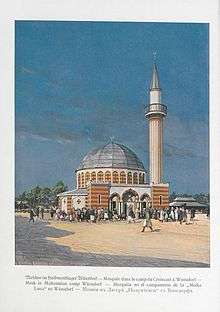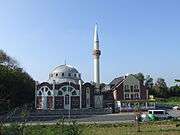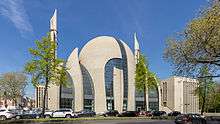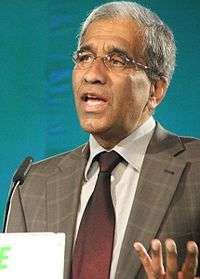Islam in Germany

Owing to labour migration in the 1960s and several waves of political refugees since the 1970s, Islam has become a visible religion in Germany.[1] According to a national census conducted in 2011, 1.9% of Germany's population (around 1.5m people) declared themselves as Muslim. However, this is likely to underestimate the true number, given that many respondents may have exercised their right not to state their religion.[2] An estimate made in 2009 calculated that there are 4.3 million Muslims in Germany (5.4% of the population). Of these, 1.9 million are German citizens (2.4%).[3] As of 2006, about 15,000 Muslims are converts of ethnic German ancestry. According to the German statistical office 9.1% of all newborns in Germany had Muslim parents in 2005.[4]
Demographics
Islam is the largest minority religion in the country, with the Protestant and Roman Catholic confessions being the majority religions. There are between 2.1 and 4 million Muslims.[5][6][7] This lack of exactitude has to do with the fact that about half of the 4.2 million people from the Muslim World aren't believers according a study.[6]
The large majority of Muslims in Germany are of Turkish origin (63.2%),[8] followed by smaller groups from Pakistan, countries of the former Yugoslavia, Arab countries, Iran and Afghanistan. Most Muslims live in Berlin and the larger cities of former West Germany. However, unlike in most other European countries, sizeable Muslim communities exist in some rural regions of Germany, especially Baden-Württemberg, Hesse and parts of Bavaria and North Rhine-Westphalia. Owing to the lack of labour immigration before 1989, there are only very few Muslims in the former East Germany. The majority of Muslims in Germany are Sunnis, at 75%. There are some members of the Shia (7%) and mostly from Iran. The Ahmadiyya Muslim Community organization comprise a minority of Germany's Muslims, numbering some 35,000 members or a little over 1% of the Muslim population,[9] and are found in 244 communities[9] as of 2013.
History
Muslims first came to Germany as part of the diplomatic, military and economic relations between Germany and the Ottoman Empire in the eighteenth century.[10] Twenty Muslim soldiers served under Frederick William I of Prussia, at the beginning of the eighteenth century. In 1745, Frederick II of Prussia established a unit of Muslims in the Prussian army called the "Muslim Riders" and consisting mainly of Bosniaks, Albanians and Tatars. In 1760 a Bosniak corps was established with about 1,000 men.[11]
In 1798 a Muslim cemetery was established in Berlin. The cemetery, which moved in 1866, still exists today.[12]
The German section of the World Islamic Congress and the Islam Colloquium, the first German Muslim educational institution for children, were established in 1932. At this time there were 3,000 Muslims in Germany, 300 of whom were of German descent.
Adolf Hitler was an admirer of Islam, having been quoted as saying:
| “ | Had Charles Martel not been victorious at Poitiers [...] then we should in all probability have been converted to Mohammedanism, that cult which glorifies the heroism and which opens up the seventh Heaven to the bold warrior alone. Then the Germanic races would have conquered the world.[13] | ” |
The Islamic Institut Ma’ahad-ul-Islam was founded in 1942, during World War II, and is now known under the name "Zentralinstitut Islam-Archiv-Deutschland" (Central Islamic Archive Institute).
The Grand Mufti of Jerusalem Haj Amin al-Husseini energetically recruited Muslims for the SS (Schutzstaffel), the Nazi Party’s elite military command.[14] He recruited Muslim volunteers for the German armed forces and was involved in the organization and recruitment of Muslims into several divisions of the Waffen SS and other units.
After the West German Government invited foreign workers ("Gastarbeiter") in 1961, the figure sharply rose to currently 4.3 million within two decades (most of them Turkish from the rural region of Anatolia in southeast Turkey). They are sometimes called a parallel society within ethnic Germans.[15]
Denominations


Muslims in Germany belong to serval different branches of Islam (approximately data):
- Sunnis 2,640,000[16][17]
- Alevis 500,000[16][17]
- Twelvers Shi'as 225,500[16][17]
- Alawites 70,000[16][17]
- Ahmadiyya Muslim Community 35,000-45,000[16][17][18][19]
- Sufis 10,000[16][17]
- Salafis 8,350[16]
- Ismailis 1,900[16][17]
- Zaydis 800[16][17]
- Ibadis 270[16][17]
- Lahore Ahmadiyya Movement 60[20]
Islamic organisations
Only a minority of the Muslims residing in Germany are members of religious associations.
Sunni
- Diyanet İşleri Türk İslam Birliği (DİTİB): German branch of the Turkish Presidency for Religious Affairs, Cologne. As of 2016, the Turkish government funds and provides staff for 900 of Germany's roughly 3000 mosques run by DİTİB.[21]
- Islamische Gemeinschaft Milli Görüş: close to the Islamist Saadet Partisi in Turkey, Kerpen near Cologne
- Islamische Gemeinschaft Jamaat un-Nur (de): German branch of the Risale-i Nur Society (Said Nursi)
- Islamische Gemeinschaft in Deutschland organization of Arab Muslims close to the Muslim Brotherhood, Frankfurt
In addition there are numerous local associations without affiliation to any of these organisations. Two organisations have been banned in 2002 because their programme was judged as contrary to the constitution: The "Hizb ut-Tahrir" and the so-called "Caliphate State" founded by Cemalettin Kaplan and later led by his son Metin Kaplan.
Ahmadiyya
- Ahmadiyya Muslim Jamaat Deutschland: German branch of the worldwide Ahmadiyya Muslim Community. There is no ethnicity or race associated with this community although most of the members of the community residing in Germany are of Pakistani origin. The Ahmadiyya Muslim Community was established in Germany in 1923 in Berlin and is one of the largest in Europe. Communities exist in Baden-Württemberg, Lower Saxony, North Rhine-Westphalia, Hesse and Bremen.[22]
- Lahore Ahmadiyya Movement: German branch of the worldwide Lahore Ahmadiyya Movement.
Liberal Islam
- Liberal-Islamischer Bund LIB: Liberal association, founded by Lamya Kaddor.
- Muslimisches Forum Deutschland MFD: Forum for Muslims and non-Muslims to promote Islamic reforms, founded among others by Mouhanad Khorchide and Ahmad Mansour.
- Verband Demokratisch-Europäischer Muslime VDEM: Association founded by Bassam Tibi.
- Ibn Rushd Prize for Freedom of Thought.
Others
- Verband der islamischen Kulturzentren: German branch of the conservative Süleymancı sect in Turkey, Cologne
- Verband der Islamischen Gemeinden der Bosniaken: Bosnian Muslims, Kamp-Lintfort near Duisburg
- Zentralinstitut Islam-Archiv-Deutschland e.V. : Documentary of Islamic Foundation-writings since 1739. The Islamic Institute was founded in 1942 (Sooner called Ma’ahad-ul-Islam Institut).
Umbrella organisations
Furthermore, there are the following umbrella organisations:
- Central Council of Muslims in Germany (Zentralrat der Muslime in Deutschland)
- Islamic Council in Germany (Islamrat in Deutschland)
Controversies
As elsewhere in Western Europe, the rapid growth of the Muslim community in Germany has led to social tensions and political controversy, partly connected to Islamic extremism, and partly more generally due to the difficulties of multiculturalism and fears of Überfremdung.
In the education system

One such issue concerns the wearing of the head-scarf by teachers in schools and universities. The right to practice one's religion, claimed by the teachers in question, contradicts in the view of many the neutral stance of the state towards religion. As of 2006, many of the German federal states have introduced legislation banning head-scarves for teachers. It is almost certain that in 2006 these laws will be validated as constitutional. However, unlike in France, there are no laws against the wearing of head-scarves by students.
In the German federal states with the exception of Bremen, Berlin and Brandenburg, lessons of religious education overseen by the respective religious communities are taught as an elective subject in state schools. It is being discussed whether apart from the Catholic and Protestant (and in a few schools, Jewish) religious education that currently exists, a comparable subject of Islamic religious education should be introduced as a regular part of the curricula. In several states, trials for Islamic religious education are being conducted, while in the states of Hessen, Lower-Saxony and Northrhine-Westphalia, Islamic religious education already is integrated as a regular class. However, the problem still exists that the cooperation with Islamic organisations is hampered by the fact that none of them can be considered as representative of the whole Muslim community.
Construction of mosques and other projects
The construction of mosques occasionally arouses hostile reactions in the neighbourhoods concerned. For example, in 2007 an attempt by Muslims to build a large mosque in Cologne sparked a controversy.[23]
Similarly with the Sendlinger Mosque Controversy, and the proposed construction of a training academy in Munich, originally called the "Centre for Islam in Europe, Munich" (ZIE-M), and later the "Munich Forum for Islam".[24]
Islamic Theological Studies
In 2010, the German Ministry of Education and Research established Islamic Theological Studies as an academic discipline at public universities in order to train teachers for Islamic religious education and Muslim theologians. Since then, Islamic theological departments have been established at several universities, conducting research and teaching on Islam from a theological perspective. [25]
Fears of Islamic fundamentalism
Fears of Islamic fundamentalism came to the fore after September 11, 2001, especially with respect to Islamic fundamentalism among second- and third-generation Muslims in Germany - the Hamburg cell, which included Mohamed Atta, was prominent in the planning and execution of the September 11 attacks. Also the various confrontations between Islamic religious law (Sharia) and the norms of German Grundgesetz and culture are the subject of intense debate. German critics include both liberals and Christian groups. The former claim that Islamic fundamentalism violates basic fundamental rights whereas the latter maintain that Germany is a state and society grounded in the Christian tradition.
According to a 2012 poll, 72% of the Turks in Germany believe that Islam is the only true religion and 46% wish that one day more Muslims live in Germany than Christians.[26][27][28] According to a 10-year survey by the University of Bielefeld, which dealt with different aspects of attitudes to Islam, mistrust of Islam is widespread in Germany with only 19 percent of Germans believing that Islam is compatible with German culture.[29]
According to 2013 study by Social Science Research Center Berlin, two thirds of the Muslims interviewed say that religious rules are more important to them than the laws of the country in which they live, almost 60 percent of the Muslim respondents reject homosexuals as friends; 45 percent think that Jews cannot be trusted; and an equally large group believes that the West is out to destroy Islam (Christian respondents’ answers for comparison: As many as 9 percent are openly anti-Semitic; 13 percent do not want to have homosexuals as friends; and 23 percent think that Muslims aim to destroy Western culture).[30]
Banning of IHH Germany
In July 2010, Germany outlawed the Internationale Humanitäre Hilfsorganisation e.V. (IHH Germany), saying it had used donations to support Hamas, which is considered by the European Union and Germany to be a terrorist organization,[31][32] while presenting their activities to donors as humanitarian help. German Interior Minister Thomas de Maiziere said, "Donations to so-called social welfare groups belonging to Hamas, such as the millions given by IHH, actually support the terror organization Hamas as a whole."[31][32] IHH e.V. was believed by the German Authorities to have collected money in mosques and to have sent $8.3 million to organizations related to Hamas.[33]
Religiosity of young Muslims
Studies show that while not all Muslims are religious, Muslim youths are markedly more religious than non-Muslim youths. A study comparing Turkish Muslim youths living in Germany and German youth found that the former were more likely to attend religious services regularly (35% versus 14%).[34]
41% of young Turkish Muslim boys and 52% of the girls said they prayed "sometimes or regularly", 64% of boys and 74% of girls said they wanted to teach their children religion.[34]
Religiosity of the Muslim parent generation
While the Muslim parent generation is more religious than the non-Muslim parent generation, not everybody is religious. 10% of the youths, which lived in Eastern Germany and 28% of the youths which lived in Western Germany come from a set of parents which is described as "fairly religious" or "very religious". 73% of Muslim youths in Germany do.</ref name="Gesemann2">
Notable German Muslims
A
- Vaneeza Ahmad a Pakistani-German model
- Mehmed Ali Pasha (marshal) was a German-born Ottoman soldier
B
- Kristiane Backer a German television presenter, television journalist and author
- Atif Bashir, footballer, plays for Barry Town in the Welsh Football League First Division.
- Aslı Bayram a German actor and writer and an honorary Ambassador for Crime Prevention by the Justice Ministry Hessen, Germany
- Danny Blum, German Soccer player
C
- Denis Cuspert a German militant Islamist and former rapper
D
- Sevim Dağdelen a German politician and a member of the German parliament Bundestag
- Ekin Deligöz a Turkish-German politician and a member of the German parliament Bundestag
E
- Khalid El-Masri
- Ibrahim El-Zayat a European Muslim activist in Germany and has been a functionary in many important Islamic organizations in Germany, Europe, and Saudi Arabia.
F
- Abdoldjavad Falaturi was a German scholar of Iranian origin
G
- Yasmeen Ghauri a model born in Canada of mixed Pakistani and German descent
- Cemile Giousouf a German politician and a member of the German parliament Bundestag
- Fritz Grobba was a German diplomat during the interwar period and World War II
- Karim Guédé a football player
H
- Murad Wilfried Hofmann a prominent German diplomat and author
- Hadayatullah Hübsch German writer and journalist
- Ashiq Hussain, Neuroscientist, Max Planck Institute of Neurobiology
K
.jpg)
- Lamya Kaddor a German writer and known for introducing Islamic education in German in public schools in Germany
- Jawed Karim a German-American Internet entrepreneur
- Elsa Kazi was a German writer of one-act plays, short stories, novels and history, and a poet
- Hasnain Kazim an author and journalist, correspondent of the German news magazine Der Spiegel and Spiegel Online
- Necla Kelek a German feminist and social scientist
- Navid Kermani a German writer and a scholar of Islam
- Sami Khedira, German Soccer player
- Mouhanad Khorchide, Professor for Islamic theology at the University of Münster.
- Sead Kolašinac a Bosnian professional footballer
L
- Mojib Latif, Professor, meteorologist and oceanographer
- Johann von Leers was a member of the Waffen SS in Nazi Germany, where he was also a professor known for his anti-Jewish polemics
M
- Jamal Malik, Professor of Islamic Studies and chair of Religious Studies, University of Erfurt, Germany
- Shkodran Mustafi a German professional footballer
N
- Youssef Nada a noted businessman and Muslim Brotherhood financial strategist.
- Adam Neuser was a popular pastor and theologian
- Omid Nouripour an Iranian-German politician and a member of the German parliament Bundestag
O
- Susanne Osthoff a German archaeologist
- Cem Özdemir a German politician and a member of the German parliament Bundestag since 2013 and between 1994 and 2002 and of the European Parliament between 2004 and 2009
- Mesut Özil, German Soccer player
- Aydan Özoğuz a German politician and a member of the German parliament Bundestag

S
- Ahmed Siddiqui, a suspected terrorist
T
- Bassam Tibi a political scientist and Professor of International Relations
V
- Pierre Vogel a radical German Islamic preacher and a former professional boxer
German Orientalists
See also
- Islamic Centre Hamburg
- Islamic dress in Europe
- List of mosques in Germany
- Religion in Germany
- Turks in Germany
References
- ↑ "Rauf Ceylan: Muslims in Germany: Religious and Political Challenges and Perspectives in the Diaspora,
- ↑ "Census reveals German population lower than thought". BBC News. Retrieved 31 May 2013.
- ↑ http://www.dw-world.de/dw/article/0,,4419533,00.html
- ↑ Frank Gesemann. "Die Integration junger Muslime in Deutschland. Interkultureller Dialog - Islam und Gesellschaft Nr. 5 (year of 2006). Friedrich Ebert Foundation, on p. 8 - the document is written in German
- ↑ REMID Data of "Religionswissenschaftlicher Medien- und Informationsdienst" retrieved 16 January 2015
- 1 2 "Religionszugehörigkeit Bevölkerung Deutschland" (PDF) (in German). Forschungsgruppe Weltanschauungen in Deutschland. Retrieved 24 January 2016.
- ↑ Bundesamt für Migration und Flüchtlinge (2009). "Muslimisches Leben in Deutschland 2008", pp 11, 80
- ↑ "Germany". Berkley Center for Religion, Peace, and World Affairs. Retrieved 2011-12-29.
- 1 2 "Mitgliederzahlen: Islam", in: Religionswissenschaftlicher Medien- und Informationsdienst|Religionswissenschaftliche Medien- und Informationsdienst e. V. (Abbreviation: REMID), Retrieved 24 January 2016
- ↑ State Policies Towards Muslim Minorities. Sweden, Great Britain and Germany, "Muslims in German History until 1945", Jochen Blaschke
- ↑ Frederick the Great's Army Albert Seaton. Islam and Muslims in Germany. Osprey Publishing. ISBN 0-85045-151-5
- ↑ Islamischer Friedhof am Columbiadamm
- ↑ Hitler, Adolf (1953). Hitler's Table Talk, 1941–1944: His Private Conversations. Translated by Norman Cameron. p. 667.
- ↑ Sam Roberts (December 2010). "Declassified Papers Show U.S. Recruited Ex-Nazis". New York Times. Retrieved 2011-01-03.
- ↑ "Rauf Ceylan: Immigration and Socio-Spatial Segregation - Opportunities and Risks of Ethnic Self-Organisation,
- 1 2 3 4 5 6 7 8 9 10 "Mitgliederzahlen: Islam", in: Religionswissenschaftlicher Medien- und Informationsdienst|Religionswissenschaftliche Medien- und Informationsdienst e. V. (Abbreviation: REMID), Retrieved 27 January 2016
- 1 2 3 4 5 6 7 8 9 "Anzahl der Muslime in Deutschland nach Glaubensrichtung im Jahr 2015* (in 1.000)", in: Statista GmbH, Retrieved 27 January 2016
- ↑ "Was ist "Ahmadiyyat"?", in: Ahmadiyya Muslim Jamaat Germany Website, Retrieved 27 January 2016
- ↑ "Mosque construction continues with community support: Ahmadi Muslim leader, Retrieved 22 July 2016
- ↑ Der Tagesspiegel: Moschee in Wilmersdorf: Mit Kuppel komplett, 29 August 2001, Retrieved 27 January 2016
- ↑ "Old Faultlines". The Economist. 6 August 2016. Retrieved 9 August 2016.
- ↑ Ahmadiyya Muslim Mosques Around the World, pg. 44
- ↑ "Germany". Berkley Center for Religion, Peace, and World Affairs. Retrieved 2011-12-29. See drop-down essay on "Religious Freedom in Germany"
- ↑ https://wikileaks.org/cable/2007/12/07MUNICH646.html
- ↑ Jan Felix Engelhardt, "On Insiderism and Muslim Epistemic Communities in the German and US Study of Islam", The Muslim World No 4, 2016, p. 740-758
- ↑ Liljeberg Research International: Deutsch-Türkische Lebens und Wertewelten 2012, July/August 2012, p. 67
- ↑ Die Welt: Türkische Migranten hoffen auf muslimische Mehrheit, 17 August 2012, retrieved 23 August 2012
- ↑ The Jewish Press: In Germany, Turkish Muslims Hope for Muslim Majority, 27 August 2012, retrieved 27 September 2012
- ↑ Deutsche Welle: "Why Germans distrust Islam" by Ulrike Hummel January 21, 2013
- ↑ http://www.wzb.eu/en/press-release/islamic-fundamentalism-is-widely-spread
- 1 2 Germany bans group accused of Hamas links, Ynet 07.12.10
- 1 2 Germany outlaws IHH over claimed Hamas links, Haaretz 12.07.10
- ↑ "Germany IHH e.V. ban shameful, illegal, says group leader". Today's Zaman. 14 July 2010.
- 1 2 Frank Gesemann. "Die Integration junger Muslime in Deutschland. Interkultureller Dialog - Islam und Gesellschaft Nr. 5 (year of 2006). Friedrich Ebert Stiftung", on p. 9 - the document is written in German
Further reading
- Amir-Moazami, Schirin (December 2005). "Muslim Challenges to the Secular Consensus: A German Case Study". Journal of Contemporary European Studies. 13 (3): 267–286. doi:10.1080/14782800500378359.
External links
- Ahmadiyya Muslim Community Deutschland
- Links: Islam in Germany
- Germany: European Muslim Union with its offices in Granada, Spain, Bonn, Istanbul and Sarajevo
- A German Initiative to Bridge the Gap



